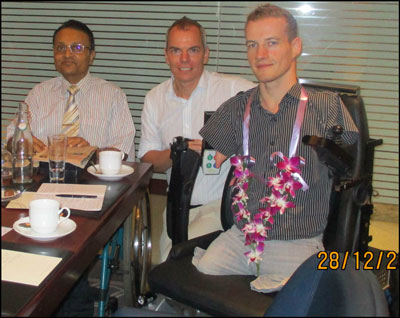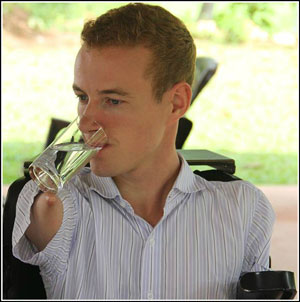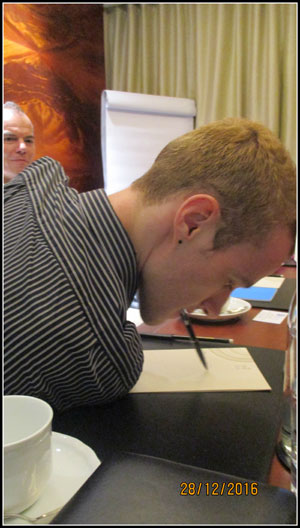Sunday Times 2
“Don’t dis-Able me” – The fighter with no arms no legs
View(s):Excerpts of aninterview withJanis McDavid

Janis (accompanied by his care-giver Sven Hasse) being interviewed by Dr. Ajith C. S. Perera.
By: Dr. Ajith C. S. Perera
Janis McDavid was born with no arms no legs and many find it off-putting.
Despite these limitations, he has embarked on university studies, drives a (modified) van, travels the world extensively and is an impressive motivational speaker.
He looked up at me, extended his stump of an upper right arm in greeting, and smiled…. “Hi, I’m Janis.”
Achievements are far more appreciated if they have been accomplished with an apparent significant physical limitation in ability.
It takes courage for any normal man to achieve an outstanding feat when he lacks something important in daily life; it requires extra-ordinary effort and commitment for a person with a serious physical limitation to level the fame.
Few people are successful in situations where others would have given up. They surmount with determination and perseverance hurdles that lead others to fail.
How have these people managed to succeed in the face of adversity? They all have ambition — but there is much more in them.
Fighter for dis-Ability Rights
“I’m able to perform much better if you don’t dis-Able me!”
- Janis McDavid –
He believes education is the key to open people’s mind. “It helps me to gain knowledge and develop creativity”.
Janisspeaks at conferences and workshops to motivate people tofocus on the positive side and to concentrate on the power within themselves to achieve great things.
He joins German Parliamentary sub committees as an expert on promoting wider acceptance of people with dis-Abilities.
Mission in Sri Lanka
“The aim of myvisit to Sri Lanka is to enhance the positive image and make recognise the Ability of the dis-abled people. Ability is the skill to do productive things”.

We all do things differently: (Left) Janis writes as all others but uses his mouth. (Above) He pours water and drinks off the tumbler, just as we all do.
These are facts sadly missedeven by our top leaders.
Janis’s ambition is to demonstrate that everyone can make something of their lives, and that people with dis-Abilities are often hardly marginalised at all if no one stands in their way – attitudes and built environments in particular.
It is anart with strategy he had to teach himself, and many others as well: He gently takes the edge of his glass of fruit juice between his lips, lifts it with the help of his short right arm, and balances it there while he drinks.
He writes with his mouthholding the pen between his molars- always on his right side because he can’t write with his left side- (see the photo).
To slip into his shirt, he lifts it up with a wooden stick, which is roughly as long as the arm that he doesn’t have. And then he slides it over his head.
Janis can drive using a specially modified van;He is an avid traveller. He has already been to Brazil, Vietnam, Burma and Cuba.
He is determined to discover a new country every year – this year it is Sri Lanka. “I won’t allow myself to be stopped,” he says.
Banish undesired limitations
“It would have been much more dangerous for me to stay at home, because I might have succumbed to loneliness and laziness, and would not have become the fighter that I am today”.
“No onecan escape from his body. The only thing we can do is: Learn to accept ourselves, overcome inhibitions and convince our brainsmore is achievable.I’m very fortunate because I enjoy what I do to make a positive difference.For my dignity I always try to do what I can.”
His book:DeinBestesLeben (Your BestLife)is a top seller in Germany.
His core message: “The impossible can be made possible – for all of us. Believe in your strengths; they outweigh weaknesses we all have.”
Actually, nothing is impossible and in reality it is easier than most of us think.
As an adolescent, he initially hopped up stairs and avoided going out in public without a wheelchair. But he ultimately realized that his embarrassment was an additional unwanted limitation, as were bad moods.
 “I would then get upset about lot of such thingsthat I have no control about,” says Janis;“but I soon realised it wouldn’t do me any good.”
“I would then get upset about lot of such thingsthat I have no control about,” says Janis;“but I soon realised it wouldn’t do me any good.”
Like all of us, Janis also has limitations as some things he simply cannot do;Toopen a door, for instance, or to overcome even two steps at an entrance. And he can’t go unnoticed on the streets!
Janis practices what he preaches. He shows us how he enables himself to live a life anyone else would live provided the built environment do not make him dis-ABLE.
It is important to think about the design of buildings – that includes places of education, shops,bookshops, restaurantsbanks and ATMs – so that no one gets dis-Abled and marginalised, everyone is equally catered for and equal access is assured to all.
This is also paramount for services and businesses to grow and achieve their optimum potential.
A Good Start – low cost and feasible
Janis and I finally focused on these three key areas.
(i). All of us are abled differently.When entrances, doors, steps and toilets are rightly designed, as Janis and I agree,people are empowered to live up to their optimum potential enabling them to become productive employees, entrepreneurs and consumers, along with everybody else.
Ensure that physical infrastructures, public facilities and services,at least, under new Mega-polis agendaINCLUDE, not Exclude,Everyone.
Inaccessible tourism denies new profits for Sri Lanka – Janis too agrees.
International theme for 2017 is Accessible Tourism but, STILL,Janis tells: “Permitting man-made physical and social obstacles to grow,Sri Lankais wasting resources and preventing becoming the destination of choice for a generation destined to transform the travel, hotel and tourism industry”.
(ii). A change of perceptions focusing Ability within dis-Ability – that is what this visit of Janis McDavis is about – is an essential low-cost investment to project the positive image and improve even the country situation.
(iii).“Sri Lanka Government NOW has a binding legal obligation as a high priority to fulfil these requirements, at least those clauses that do not require any NEW Laws and Billsor incur extra costs – It is part of the UN Convention that they have ratified.
Two such examples are:
(a). Awareness raisingas per the preamble and Article 8 here, for the Stateto recognizethe valued contributions made by such persons with dis-abilities.
(b). Article 4.3 further stipulates:To give opportunities to be heard by the State in CLOSELY consulting with and ACTIVELY involving People with dis-Abilities in decision making processes and developing policies, concerning issues related to them.
They are also the Government’s moral duty and social responsibility; but yet NOT recognised by the top politicians even after almost a year has passed since ratification.
Finally Janis tells:“My visit here and the outcome of this interviewwith you,is for a better tomorrow and for Sri Lanka’s good name too”.
[Interviewer Dr. Ajith C. S. Perera– a professional - is the pioneer accessibility activist here and a widely experienced accessibility adviser promoting over two decades of time the theme: “Ability (of all) is much stronger than dis-Ability”.For details see:goo.gl/wPeOax]

